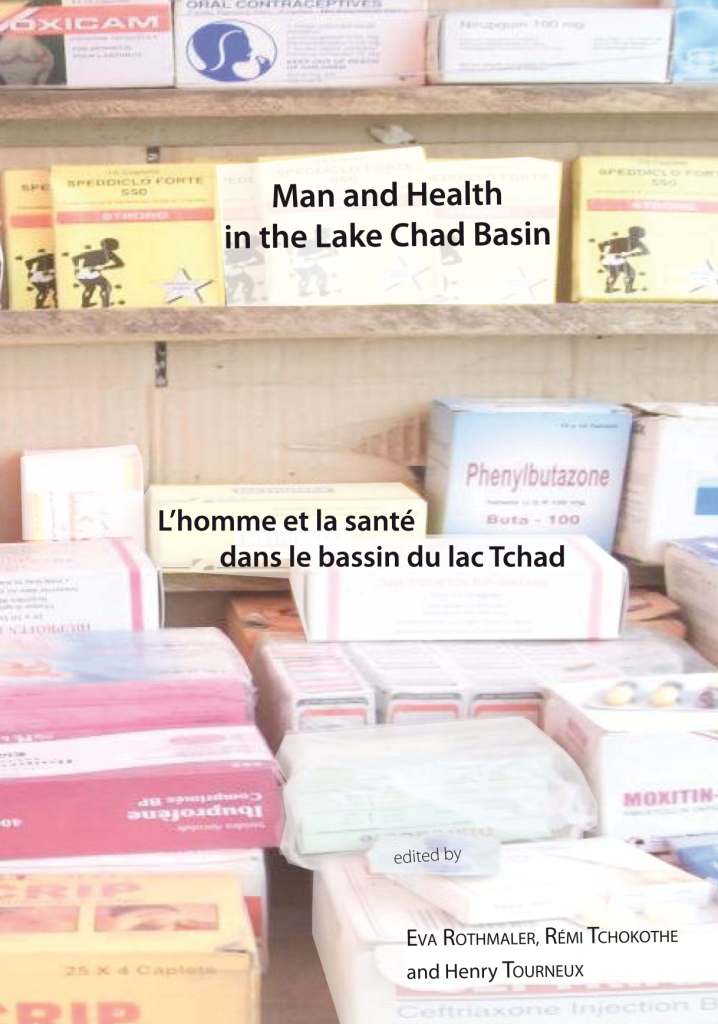
Man and Health in the Lake Chad Basin / L’homme et la santé dans le bassin du lac Tchad
Proceedings of the 14th MEGA-CHAD Conference Bayreuth, 15-17 April 2010
Edited by: Eva Rothmaler, Rémi Tchokothe, Henry Tourneux. With an introduction by: Eva Rothmaler, Rémi Tchokothe. With contributions by: Mahamat Adam, Boureima Amadou, Claude Arditi, Zakaria Beine, Baba Mai Bello, Abdoulaye Boubakary, Gundula Essig, Elisa Fiorio, Émilie Guitard, Hadiza Kiari Fougou, Hadidja Konaï, Tilman Musch, Eckhard Nagel, Eva Rothmaler, Paulette Roulon-Doko, Henry Tourneux.
Series: TIAS Topics in Interdisciplinary African Studies Volume 27
20126 pp. Roman, 202 pp.
1 colour map, 3 b/w maps, 8 colour photos, 8 b/w photos, numerous tables and charts
Text language(s): French, English
Format: 160 x 240 mm
530 g
Paperback
€ 39.80
Buy 'Man and Health in the Lake Chad Basin / L’homme et la santé dans le bassin du lac Tchad' as a downloadable PDF document directly from our online shop »
Order 'Man and Health in the Lake Chad Basin / L’homme et la santé dans le bassin du lac Tchad' as print edition »
Mega-Chad is an international network that has as its aims the encouragement and support of multidisciplinary research on the societies and environments past and present of the Lake Chad basin, and the dissemination of research results. Following a first multidisciplinary meeting held in Paris in 1984, the network has grown progressively to its present total of about 350 members in some twenty countries. The network name Mega-Chad evokes the maximal extension of Lake Chad several millennia ago and refers to a vast area extending over much of Niger, Chad, northern Nigeria and northern Cameroon and the Central African Republic within which are many shared cultural traditions, influences and patterns of exchange.
The present volume contains contributions to the XIVth Mega-Chad Colloquium which took place in Bayreuth from the 15th to the 17th of April 2010. The topics of the papers presented covered a wide spectrum connected to health issues, ranging from matters of health management, dietetics, and traditional medicine to country-specific problems and developments, as well as HIV/AIDS discourses in various communities.
Table of Contents / Table de matières
Eva Rothmaler / Rémi Tchokothe: Introduction
Mahamat Adam: Les maladies provoquées par le monde invisible dans les contes kotoko de Makari (Cameroun)
Claude Arditi: Maladies et médecines humaines dans Sahara et Soudan de G. Nachtigal (1834–1885)
Zakaria Beine: Le commerce frauduleux des produits pharmaceutiques dans les rues de N’Djamena
Baba Mai Bello: Hausa-English Perceptions of AIDS among University Students in North-eastern Nigeria
Elisa Fiorio: Une pratique rituelle préventive pour « conjurer » la maladie chez les Tupuri du Tchad
Émilie Guitard: Le fou, le génie et le tas d’ordures – la passion des déchets comme marqueur de la folie dans la ville de Garoua (Nord Cameroun)
Hadiza Kiari Fougou / Boureima Amadou: Cadre de vie et santé des pêcheurs de la partie nigérienne du lac Tchad
Tilman Musch: Saignée et cautérisation chez les pasteurs nomades de N’guigmi – la dichotomie du chaud et du froid
Eckhard Nagel / Gundula Essig: The TRIPS Agreement and Public Health: How Global – Decision-making Influences Access to Local Health Care
Eva Rothmaler: Cuisine as Health Factor – Some Aspects of Nutrition in Western Africa
Paulette Roulon-Doko: La maladie en milieu traditionnel Gbaya (Centrafrique)
Henry Tourneux / Abdoulaye Boubakary / Hadidja Konaï: Deux affiches de la fondation Coca-Cola pour la prévention du SIDA
Under these links you will find monographs and paper collections focusing on African and Asian health care systems:
Accompanying material:
- “Once a child leaves the womb, the community has to become the womb.”
(ISBN 978-3-89645-852-0 ) - Alltägliche Zauberei
(ISBN 978-3-89645-310-5 ) - Dealing with Disorder
(ISBN 978-3-89645-082-1 ) - Ein Heilungsritual der Dama, Südwestafrika/Namibia
(ISBN 978-3-89645-351-8 ) - Khoisan Medicine in History and Practice
(ISBN 978-3-89645-148-4 ) - La vie berbère par les textes
(ISBN 978-3-89645-923-7 ) - Medicine Experts of the |Xam San
(ISBN 978-3-89645-147-7 ) - Menschen mit Albinismus
(ISBN 978-3-89645-846-9 ) - Perspektiven afrikanistischer Forschung / Perspectives de recherches africanistes
(ISBN 978-3-927620-82-7 ) - Responding to Disease Outbreak in Cameroon
(ISBN 978-3-89645-855-1 ) - The Bashada of Southern Ethiopia
(ISBN 978-3-89645-825-4 ) - The Right to Compensation for Victims of Internal Armed Conflicts in East Africa
(ISBN 978-3-89645-644-1 ) - Trommeln in der Kirche
(ISBN 978-3-89645-917-6 ) - Voices of Affliction
(ISBN 978-3-89645-245-0 )
Cross-reference:
- Religion und Heilkunst der Toba-Batak auf Sumatra
(ISBN 978-3-89645-445-4 ) - Sie kamen als Forscher und Ärzte ...
(ISBN 978-3-89645-228-3 )
Reviews
The topics of the papers presented covered a wide spectrum connected to health issues, ranging from matters of health management, dietetics, and traditional medicine to country-specific problems and developments, as well as HIV/AIDS discourses in various communities. The twelve papers deal with „invisible“ causes of illness in stories from Cameroon, fraudulent medicines, perception of Aids among students in Nigeria, preventive ritual practices, hot and cold categories among nomads, global decision-making in the case of the TRIPS agreement, nutrition in western Africa, illness in traditional Central African milieus etc.
Ulrich Oberdiek in Anthropological Abstracts, 13/2012, 1
| « back | Print version | [top] |
 Books
Books Audio
Audio Biographies
Biographies Series
Series Festschrifts
Festschrifts Journals
Journals